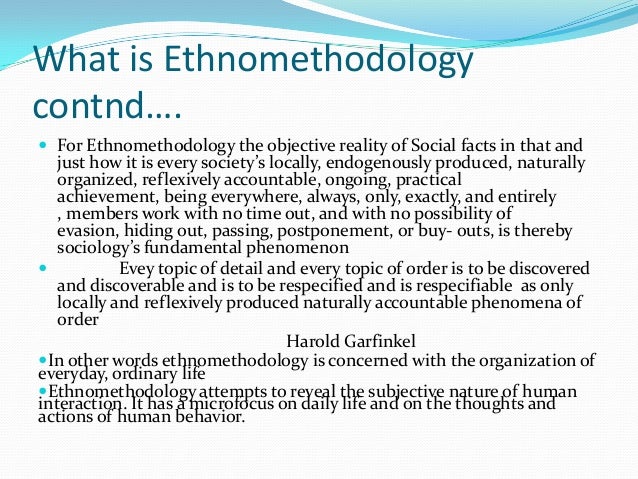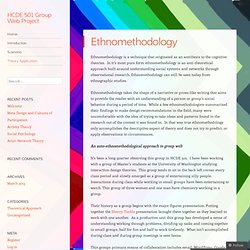Have you ever wondered how people manage to navigate the complex social world around them? From simple tasks like ordering coffee to intricate interactions like attending a business meeting, we seem to instinctively know how to act and react in different situations. But how do we acquire this knowledge? What are the unspoken rules that govern our social interactions? This is where ethnomethodology, a fascinating and often overlooked area of sociology, comes in.

Image: www.slideshare.net
Ethnomethodology, literally meaning “the study of people’s methods,” explores how individuals create and sustain social order through everyday practices. Instead of focusing on large-scale social structures, it delves into the micro-level interactions and the unwritten rules that shape our understanding of the world. Think of it as uncovering the invisible scripts that we follow, often unconsciously, in our daily interactions.
Unveiling the Subtleties: Ethnomethodology in Action
Example 1: The Coffee Shop Encounter
Imagine you walk into a bustling coffee shop, hoping for a quick caffeine pick-me-up. You approach the counter, and the barista greets you with, “Hi, how can I help you?” This seemingly ordinary interaction is packed with underlying social cues.
The barista’s greeting acknowledges your presence and opens the conversation. Their question signals your role as the customer; it expects you to order a drink, not, for example, ask about their day. Your response, in turn, confirms your understanding of the social dynamic. You might say, “I’ll have a latte, please,” demonstrating your familiarity with the coffee shop’s menu and the expected customer behavior.
This simple exchange, seemingly effortless and mundane, is a testament to the unspoken rules we learn and follow. It showcases how ethnomethodology unravels the intricacies of everyday communication and demonstrates how we navigate social situations through implicit understandings and shared knowledge.
Example 2: The “Missing” Information
Ethnomethodology often highlights the importance of “background knowledge,” often referred to as “taken-for-granted” assumptions. Let’s consider an example of a missing sign on a public restroom door.
Imagine entering a public restroom only to find that there’s no indication of which door leads to the men’s and which to the women’s. While the absence of signs may seem insignificant, it creates a moment of social awkwardness. It forces us to rely on our background knowledge and shared cultural understandings to interpret the situation. We might subconsciously look for clues like the presence of specific symbols (such as a silhouette) or the type of fixtures inside the restrooms to deduce the appropriate door.
This example demonstrates how ethnomethodology focuses on how we use our existing knowledge and social cues to make sense of ambiguous situations. It reveals that even the absence of explicit information can influence our understanding and behavior.

Image: www.pearltrees.com
Beyond the Everyday: Applications of Ethnomethodology
Ethnomethodology is not just about figuring out how to order coffee. It has significant implications for various fields, including:
- Sociology: Ethnomethodology contributes to understanding how social order is created and maintained in daily life. It helps explain how individuals interpret social situations, negotiate meanings, and make sense of the world around them.
- Anthropology: Ethnomethodologists have applied their methods to study diverse cultures and societies, uncovering the unique practices and social rules that shape human behavior in different contexts.
- Education: Educators use ethnomethodology principles to understand how students learn in classrooms, how they interpret information, and how they interact with their peers and teachers.
- Psychology: Ethnomethodology sheds light on the cognitive processes involved in interpreting social situations, how we form judgments, and how our beliefs and biases influence our interactions.
- Computer Science: Ethnomethodological approaches have been adapted to study how people interact with technology and how interfaces can be designed to facilitate seamless and intuitive experiences.
The Power of the Everyday: Understanding and Improving Social Interaction
Ethnomethodology teaches us a valuable lesson: the seemingly mundane aspects of our daily lives are essential to understanding human behavior and social order. By understanding the unspoken rules and social cues that shape our interactions, we gain a deeper appreciation for the complexity and nuance of human communication.
This knowledge can empower us to become more aware of our own social practices, to navigate social situations with greater sensitivity, and to develop better communication skills. It also helps us understand the challenges faced by individuals from diverse backgrounds or with different cultural norms, as they may interpret social situations differently due to varying implicit understandings.
As we delve deeper into the principles of ethnomethodology, we realize that the seemingly ordinary moments of our lives are brimming with meaning and significance. By embracing the power of the everyday, we can unlock a deeper understanding of ourselves and the social world that surrounds us.
Ethnomethodology Example
Further Exploration
Ethnomethodology is an expansive and ever-evolving field. This article offers a starting point for your journey into understanding this fascinating area of sociology. To explore further, consider exploring the works of prominent ethnomethodologists like Harold Garfinkel, Emanuel Schegloff, and Harvey Sacks. You can also delve into related disciplines such as conversation analysis, discourse analysis, and social interaction analysis. By actively observing and reflecting on our daily social experiences, we can uncover the hidden rules and practices that govern human interaction and gain a deeper appreciation for the complex social world we inhabit.





